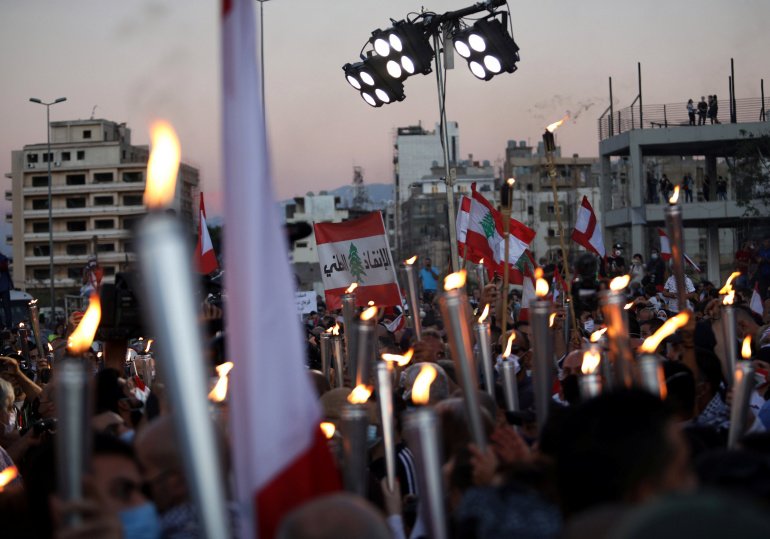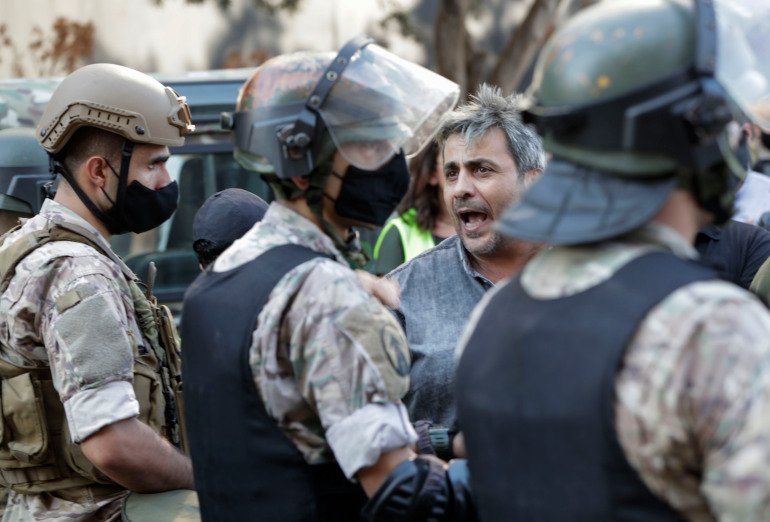
Hundreds march in Lebanon to mark year of anti-gov’t protests
Hundreds marched in Lebanon’s capital to mark the first anniversary of a non-sectarian protest movement that has rocked the political elite but has yet to achieve its goal of sweeping reform.
A whirlwind of hope and despair has gripped the country in the year since protests began, as an economic crisis and a devastating port explosion two months ago pushed Lebanon deeper into decay.
While the turmoil led to the resignation of Prime Minister Saad Hariri, politicians have since failed to form a government capable of addressing the country’s challenges.
Two governments have resigned since the movement started but the country’s barons, many of them strongmen from the 1975-1990 civil war, remain firmly in power despite international and domestic pressure for change.
On Saturday, hundreds of people brandishing placards and Lebanese flags gathered in Martyrs’ Square in the heart of Beirut in a scene reminiscent of last year’s rallies.
Protesters marched past the central bank, a target of their anger over a financial crisis that has seen the Lebanese pound lose nearly 80 percent of its value.
They then marched past the parliament building before gathering near the damaged port, observing a minute of silence just short of their destination before holding a candlelit vigil near ground zero at 6:07pm (15:07 GMT).

That was the precise time on August 4 when a huge stockpile of ammonium nitrate fertiliser exploded, killing more than 200 people and devastating swaths of the capital – a disaster widely blamed on the corruption and incompetence of the hereditary elite.
Activists have installed a metallic monument at the site to mark the anniversary of their October 17 “revolution”.
“For a year, we have been on the streets … and nothing has changed,” said Abed Sabbagh, a protester in his seventies.
“Our demand is the removal of a corrupt political class that continues to compete for posts and seats” despite everything happening in the country, he told the AFP news agency from Beirut’s main protest camp.
‘Deeply ruined’
The immediate trigger for last year’s demonstrations was a government move to tax WhatsApp calls, but they swiftly swelled into a nationwide movement demanding an end to a system of confessional power-sharing that protesters say has tarnished public life.
Lebanon’s deepest economic downturn since the civil war has led to growing unemployment, poverty and hunger, pushing many to look for better opportunities abroad.
“Our government along with political parties crushed our hopes,” said May, a 25-year-old university student.
“We are tired and deeply ruined, they left us no other choice but to leave.”
A spiralling coronavirus outbreak since February prompted a ban on public gatherings but even without protesters on the streets, public resentment has grown.
The explosion at Beirut port prompted protesters to return to the streets in its aftermath, but the movement then shifted most of its energy to relief operations to fill in for what it sees as an absent state.
The political class has since failed to form a new government that can meet the demands of the street and international donors who have refused to release desperately needed funds.
French President Emmanuel Macron, who visited Lebanon twice in the aftermath of the port blast, said the country’s ruling class had “betrayed” the people by failing to act swiftly and decisively.
‘Another face of the revolution’
President Michel Aoun is due to hold consultations with the main factions in Parliament next week before designating a new prime minister for the third time in less than a year.
Hariri, who bowed out in the face of the first protests last October, is expected to make a comeback in an appointment that activists are likely to reject.
Aoun on Saturday renewed his call for protest leaders to work with the state and existing institutions – an appeal repeatedly rebuffed by activists.
The protest movement has maintained a loose structure that some analysts believe could be an impediment.
“The lack of political programmes and leadership have made the process and progress rather daunting and difficult,” said Jamil Mouawad, who teaches political science at the American University of Beirut.

A revolt against the status quo means breaking a sectarian patronage network cultivated by the ruling elite that many in the divided population benefit from.
Even if dissatisfied, some blame other factions for the country’s problems or fear change will give another sect power over them – a fear politicians eagerly stoke.
“We don’t have one head of state, it’s a group of men, they have agreed to divide the spoils of the state at every level. It’s a system that you can hardly topple,” Carmen Geha, associate professor in public administration and an activist, told The Associated Press news agency.
She compared the dismantling of Lebanon’s system with the dismantling of apartheid in South Africa, a long and arduous process.
For all its limitations, the protest movement had successes.
Even after street demonstrations dissipated, grassroots networks quickly mobilised following the Beirut explosion.
The authorities almost completely left the public on its own to deal with the aftermath, with no government clean-up crews in the streets and little outreach to those whose homes or businesses were wrecked.
“You find people more mobilised toward helping each other … that is another face of the revolution,” Geha said.
“We need to show people how inept politicians are and provide them with an alternative system, one focused on services.”










